Indian Society
₹190.00
The Civil Services Examination (CSE) is a nationwide competitive examination in India conducted by the Union Public Service Commission for recruitment to various Civil Servants of the Government of India, including IAS, IFS, IPS and IRS. It is conducted in three phases – Preliminary Examination consisting of two objective-type papers (General Studies Paper-I and General Studies Paper II also popularly known as Civil Service Aptitude Test), and Main Examination consisting of four General Studies Papers, Compulsory Essay Paper and Optional Subject Paper I & II and Qualifying Paper on Indian Languages and English, followed by Interview Test.
A must-have resource for UPSC PSIR aspirants, this book provides conceptual clarity, theoretical depth, and exam-oriented analysis of comparative political systems, governance models, and frameworks. Covering key topics like political theories, state structures, globalisation, political parties, and social movements, it integrates insights from scholars such as Easton, Almond, Huntington, Dahl, and Marx.
With a structured and simplified approach, real-world examples, and critical analysis, this book enhances answer-writing skills and analytical thinking, making it an indispensable guide for UPSC aspirants, researchers, and political science enthusiasts.
Additional information
| Dimensions | 21.59 × 0.55 × 29.93 cm |
|---|
Book information
Related products
Secret History of Selection of Supreme Court Judges
About the book:
The central argument of this book is that despite all established formal constitutional requirements, there are multiple unwritten criteria that are used for appointing judges to the Supreme Court. The book examines the debates surrounding the Indian judicial system and anecdotal evidences and deeply analyses the Indian political developments that resulted in the present 'collegium system' of appointing judges to the Supreme Court of India and brings to the fore the secret and unwritten criteria that have determined the selection of judges to the highest court of law in this country. The National Judicial Appointments Commission's (NJAC) judgment on the appointment of judges to the Supreme Court has been the subject of a deeply polarized debate in the public sphere and academia. This book subsequently analyses the NJAC judgment and provides a rich context to it, in terms of philosophical, comparative, and constitutional issues that underpin it. The book examines the secret constitutional principles behind selecting judges and their application in the NJAC judgment; and comparatively looks at the judicial appointments process in the United Kingdom, South Africa, and Pakistan, enquiring into what makes a good judge and an effective appointments process. The book is a deep dive into the constitutional concepts of judicial independence and separation of powers as discussed in the NJAC judgment.About The Author:
Pavneet Singh is an educational consultant and is associated with training aspirants for the Civil Services Examination. He is also the author of many best-selling titles for the Civil Services Examination.Secret History of Selection of Supreme Court Judges
About the book:
The central argument of this book is that despite all established formal constitutional requirements, there are multiple unwritten criteria that are used for appointing judges to the Supreme Court. The book examines the debates surrounding the Indian judicial system and anecdotal evidences and deeply analyses the Indian political developments that resulted in the present 'collegium system' of appointing judges to the Supreme Court of India and brings to the fore the secret and unwritten criteria that have determined the selection of judges to the highest court of law in this country. The National Judicial Appointments Commission's (NJAC) judgment on the appointment of judges to the Supreme Court has been the subject of a deeply polarized debate in the public sphere and academia. This book subsequently analyses the NJAC judgment and provides a rich context to it, in terms of philosophical, comparative, and constitutional issues that underpin it. The book examines the secret constitutional principles behind selecting judges and their application in the NJAC judgment; and comparatively looks at the judicial appointments process in the United Kingdom, South Africa, and Pakistan, enquiring into what makes a good judge and an effective appointments process. The book is a deep dive into the constitutional concepts of judicial independence and separation of powers as discussed in the NJAC judgment.About The Author:
Pavneet Singh is an educational consultant and is associated with training aspirants for the Civil Services Examination. He is also the author of many best-selling titles for the Civil Services Examination.Disaster Management for Civil Services Examinations I UPSC Civil Services I IAS preparation
About the book:
The public policy approach to disaster management studies the responses that the state evolves when managing disasters. These state responses are important because they have implications on the development strategy that the state would adopt after the disasters have occurred and also how communities would mould their responses in future such occurrences. The book analyses the comprehensive and dedicated public policy-based disaster responses in India and how these strategies have enabled communities and governments to evolve resilient disaster management practices. The public policy perspective traces its origin from geography, uses geographical inputs, and then analyses the geospatial profile of India to examine the vulnerabilities. The book then places the distinct public policy responses to each disaster and articulates the governmental perspective on disaster management through a thorough and deep contextual analysis of the policy frameworks involved. The number of questions on Disaster Management are increasing every year in the UPSC Civil Services Main Examination even when the subject continues to receive step brotherly treatment. The problem is compounded when the subject is seen as a veritable arm of 'Geography', even when the UPSC has placed the subject under GS Mains Paper -lll. This book provides a through treatment to the subject by re-visiting the intellectual discourse through the prism of public policy and provides the readers with theoretical underlings, ideas and interdisciplinary perspectives to tackle the UPSC Main Exam questions.- Comprehensive coverage of Disaster Management
- Public Policy approach
- Interdisciplinary perspective
- Relevance to contemporary issues
Book Features:
- Disaster Management is an interdisciplinary field drawing on inputs from various disciplines, including pure sciences and management.
- Despite its broad scope, there's a tendency in UPSC coaching classes and publications to associate disaster management primarily with Geography and Environment.
- However, it's essential to recognize disaster management's deeper connection with management principles and public policy.
- The public policy approach to disaster management examines the responses formulated by the state in managing disasters, which shape future development strategies and community responses.
- Overall, the book offers a comprehensive exploration of disaster management from a public policy perspective, illuminating the strategies and frameworks shaping responses to disasters in India.
About The Author:
Pavneet Singh is a teacher for Civil Services Examination, and presently is associated with teaching in Unacademy. He has authored various bestselling books for Civil Services Examination.Disaster Management for Civil Services Examinations I UPSC Civil Services I IAS preparation
About the book:
The public policy approach to disaster management studies the responses that the state evolves when managing disasters. These state responses are important because they have implications on the development strategy that the state would adopt after the disasters have occurred and also how communities would mould their responses in future such occurrences. The book analyses the comprehensive and dedicated public policy-based disaster responses in India and how these strategies have enabled communities and governments to evolve resilient disaster management practices. The public policy perspective traces its origin from geography, uses geographical inputs, and then analyses the geospatial profile of India to examine the vulnerabilities. The book then places the distinct public policy responses to each disaster and articulates the governmental perspective on disaster management through a thorough and deep contextual analysis of the policy frameworks involved. The number of questions on Disaster Management are increasing every year in the UPSC Civil Services Main Examination even when the subject continues to receive step brotherly treatment. The problem is compounded when the subject is seen as a veritable arm of 'Geography', even when the UPSC has placed the subject under GS Mains Paper -lll. This book provides a through treatment to the subject by re-visiting the intellectual discourse through the prism of public policy and provides the readers with theoretical underlings, ideas and interdisciplinary perspectives to tackle the UPSC Main Exam questions.- Comprehensive coverage of Disaster Management
- Public Policy approach
- Interdisciplinary perspective
- Relevance to contemporary issues
Book Features:
- Disaster Management is an interdisciplinary field drawing on inputs from various disciplines, including pure sciences and management.
- Despite its broad scope, there's a tendency in UPSC coaching classes and publications to associate disaster management primarily with Geography and Environment.
- However, it's essential to recognize disaster management's deeper connection with management principles and public policy.
- The public policy approach to disaster management examines the responses formulated by the state in managing disasters, which shape future development strategies and community responses.
- Overall, the book offers a comprehensive exploration of disaster management from a public policy perspective, illuminating the strategies and frameworks shaping responses to disasters in India.
About The Author:
Pavneet Singh is a teacher for Civil Services Examination, and presently is associated with teaching in Unacademy. He has authored various bestselling books for Civil Services Examination.The Indian Economy for UPSC in Hindi
About the author:
- Sanjiv Verma -

He was associated with several premier civil services coaching institutes in Delhi and other cities like Hyderabad and Bengaluru. He was an alumnus of the prestigious Delhi School of Economics. He had been a guide and a mentor to over thousands of civil services aspirants during his decade – long teaching career.
About the book:
The main objective of this book on Indian Economy is to introduce the candidates of Union Public Service Commission to the main economic problems and issues. In the same process, the resources and various sectors are to enable the readers to critique the role, policies and schemes of the government in various economic activities. As a result, it is hoped that general readers will also be able to understand the economic developments by developing their analytical abilities and develop their own perspective regarding the economic future of India. This compilation of Indian economy is an important presentation to bring forward valuable facts. In this edition, the author has presented many new chapters and data keeping in mind the latest syllabus of the Union Public Service Commission, the discussion of which includes economic surveys, government documents and records. Economic trends and achievements of economic rates are covered along with their processes and the factors that make them possible.
Key features:
-
By addressing economic surveys, government documents, and records, the book equips readers with a holistic perspective on the economic landscape, fostering a nuanced understanding of India's economic trajectory.
-
The inclusion of up-to-date information reflects the author's commitment to providing relevant and current insights into the Indian economy.
-
The book acts as a guide for UPSC candidates preparing for the economic segment of the examination, offering a thorough understanding of economic concepts and their practical applications.
-
The discussion encompasses economic surveys, government documents, and records, ensuring a comprehensive coverage of relevant topics.
-
The author has incorporated numerous new chapters and data in this edition, aligning with the latest syllabus of the Union Public Service Commission.
The Indian Economy for UPSC in Hindi
About the author:
- Sanjiv Verma -

He was associated with several premier civil services coaching institutes in Delhi and other cities like Hyderabad and Bengaluru. He was an alumnus of the prestigious Delhi School of Economics. He had been a guide and a mentor to over thousands of civil services aspirants during his decade – long teaching career.
About the book:
The main objective of this book on Indian Economy is to introduce the candidates of Union Public Service Commission to the main economic problems and issues. In the same process, the resources and various sectors are to enable the readers to critique the role, policies and schemes of the government in various economic activities. As a result, it is hoped that general readers will also be able to understand the economic developments by developing their analytical abilities and develop their own perspective regarding the economic future of India. This compilation of Indian economy is an important presentation to bring forward valuable facts. In this edition, the author has presented many new chapters and data keeping in mind the latest syllabus of the Union Public Service Commission, the discussion of which includes economic surveys, government documents and records. Economic trends and achievements of economic rates are covered along with their processes and the factors that make them possible.
Key features:
-
By addressing economic surveys, government documents, and records, the book equips readers with a holistic perspective on the economic landscape, fostering a nuanced understanding of India's economic trajectory.
-
The inclusion of up-to-date information reflects the author's commitment to providing relevant and current insights into the Indian economy.
-
The book acts as a guide for UPSC candidates preparing for the economic segment of the examination, offering a thorough understanding of economic concepts and their practical applications.
-
The discussion encompasses economic surveys, government documents, and records, ensuring a comprehensive coverage of relevant topics.
-
The author has incorporated numerous new chapters and data in this edition, aligning with the latest syllabus of the Union Public Service Commission.
2nd ARC Reports (Reports Number 1 to 15)
2nd ARC Reports (Reports Number 1 to 15)
Bhartiya Samaaj Evam Samajik Nyay for UPSC
About the book:
The first part of this book, "Indian Society and Social Justice," focuses on Indian society, while the second part is dedicated to social justice. The first part on Indian society is divided into 14 chapters, and the second part on social justice is classified into 11 chapters. Each chapter includes model questions along with questions from previous years' Civil Services Main Examination. Additionally, the book provides a trend analysis of questions related to Indian society and social justice asked in the Civil Services Main Examination.
An appendix based on fundamental principles related to various aspects of Indian society helps students better understand core concepts. This book sheds special light on the foundation and characteristics of Indian society, the factors influencing it, and the changes observed in the context of Indian society. From the beginning, the concepts of Vasudhaiva Kutumbakam (the world is one family) and Sarve Bhavantu Sukhinah (may all be happy) have held special significance in Indian society. In view of this, special emphasis has been placed on social justice and its related aspects and components.
The author has made an effort to include, as far as possible, all aspects that are directly or indirectly related to society and social justice.
Bhartiya Samaaj Evam Samajik Nyay for UPSC
About the book:
The first part of this book, "Indian Society and Social Justice," focuses on Indian society, while the second part is dedicated to social justice. The first part on Indian society is divided into 14 chapters, and the second part on social justice is classified into 11 chapters. Each chapter includes model questions along with questions from previous years' Civil Services Main Examination. Additionally, the book provides a trend analysis of questions related to Indian society and social justice asked in the Civil Services Main Examination.
An appendix based on fundamental principles related to various aspects of Indian society helps students better understand core concepts. This book sheds special light on the foundation and characteristics of Indian society, the factors influencing it, and the changes observed in the context of Indian society. From the beginning, the concepts of Vasudhaiva Kutumbakam (the world is one family) and Sarve Bhavantu Sukhinah (may all be happy) have held special significance in Indian society. In view of this, special emphasis has been placed on social justice and its related aspects and components.
The author has made an effort to include, as far as possible, all aspects that are directly or indirectly related to society and social justice.
Samanya Hindi Avam Nibandh
About the book:
A compilation of essays related to political, social, economic, and other topics.
Inclusion of all aspects of Hindi grammar.
Detailed discussion on the practice of summarization.
Samanya Hindi Avam Nibandh
About the book:
A compilation of essays related to political, social, economic, and other topics.
Inclusion of all aspects of Hindi grammar.
Detailed discussion on the practice of summarization.
29 Years UPSC Civil Services Previous Papers I Hindi
About the book:
An adept editorial team at Unique Publishers collaborates closely to ensure students receive the best and accurate content in our books. From the book's inception until it is printed, the entire team, including authors, editors, proofreaders, and others involved in shaping the book, dedicates their expertise, knowledge, and experience to produce the rigorous content provided to students. Taking into consideration the specific requirements of students and various examinations, the carefully crafted, exam-oriented content is developed after thorough research and analysis. The experts have adopted a completely new style of presenting content that is easily understandable, moving away from the old traditional methods that were once considered the most effective. Continuously updating the content to meet the evolving needs of students, our books have become a hallmark of quality and reliability over the past 30 years.
Key Features:
-
The experts at Unique Publishers have embraced a new style of presenting content that is easily understandable for students.
-
The team has moved away from old traditional methods, adopting more effective approaches to enhance comprehension.
-
Continuous updates to the content reflect a commitment to meeting the evolving needs of students.
-
The collaborative efforts of the editorial team contribute to the success and reputation of Unique Publishers in delivering educational content.
29 Years UPSC Civil Services Previous Papers I Hindi
About the book:
An adept editorial team at Unique Publishers collaborates closely to ensure students receive the best and accurate content in our books. From the book's inception until it is printed, the entire team, including authors, editors, proofreaders, and others involved in shaping the book, dedicates their expertise, knowledge, and experience to produce the rigorous content provided to students. Taking into consideration the specific requirements of students and various examinations, the carefully crafted, exam-oriented content is developed after thorough research and analysis. The experts have adopted a completely new style of presenting content that is easily understandable, moving away from the old traditional methods that were once considered the most effective. Continuously updating the content to meet the evolving needs of students, our books have become a hallmark of quality and reliability over the past 30 years.
Key Features:
-
The experts at Unique Publishers have embraced a new style of presenting content that is easily understandable for students.
-
The team has moved away from old traditional methods, adopting more effective approaches to enhance comprehension.
-
Continuous updates to the content reflect a commitment to meeting the evolving needs of students.
-
The collaborative efforts of the editorial team contribute to the success and reputation of Unique Publishers in delivering educational content.
Environment Mind Maps for UPSC & State Civil Services
About the book:
Environment Mind Maps covers the complete syllabus in Flow Charts and is extremely beneficial for aspirants of UPSC/State Civil Services Preliminary and Main Examinations. This is a ONE STOP SOLUTION for the students to revise the numerous facts of the Ecology, Bio-diversity, Conservation, Environment Impact Assessment and Disaster Management to help them ace their preparation. The Environment needs revision and recalling of facts, and this book on ENVIRONMENT MIND MAPS is the only solution to revise the facts in a lucid manner. The book will prove to be a boon for the aspirants of CSE.
Key features:
-
The Civil Services Examination (CSE) is a nationwide competitive examination in India conducted by the Union Public Service Commission for recruitment to various Civil Servants of the Government of India, including IAS, IFS, IPS and IRS.
-
It is conducted in three phases – Preliminary Examination consisting of two objective-type papers (General Studies Paper-I and General Studies Paper II also popularly known as Civil Service Aptitude Test),
-
Main Examination consisting of four General Studies Papers, Compulsory Essay Paper and Optional Subject Paper I & II and Qualifying Paper on Indian Languages and English, followed by Interview Test.
-
Boon for Aspirants: The book on Environment Mind Maps is positioned as a beneficial tool that will prove advantageous for those aspiring to succeed in the CSE.
Environment Mind Maps for UPSC & State Civil Services
About the book:
Environment Mind Maps covers the complete syllabus in Flow Charts and is extremely beneficial for aspirants of UPSC/State Civil Services Preliminary and Main Examinations. This is a ONE STOP SOLUTION for the students to revise the numerous facts of the Ecology, Bio-diversity, Conservation, Environment Impact Assessment and Disaster Management to help them ace their preparation. The Environment needs revision and recalling of facts, and this book on ENVIRONMENT MIND MAPS is the only solution to revise the facts in a lucid manner. The book will prove to be a boon for the aspirants of CSE.
Key features:
-
The Civil Services Examination (CSE) is a nationwide competitive examination in India conducted by the Union Public Service Commission for recruitment to various Civil Servants of the Government of India, including IAS, IFS, IPS and IRS.
-
It is conducted in three phases – Preliminary Examination consisting of two objective-type papers (General Studies Paper-I and General Studies Paper II also popularly known as Civil Service Aptitude Test),
-
Main Examination consisting of four General Studies Papers, Compulsory Essay Paper and Optional Subject Paper I & II and Qualifying Paper on Indian Languages and English, followed by Interview Test.
-
Boon for Aspirants: The book on Environment Mind Maps is positioned as a beneficial tool that will prove advantageous for those aspiring to succeed in the CSE.
ETHICS Made Easy A Unique Approach to GS Paper-IV
About The Author:
Ashok Kumar, Director General of Police (DGP)

Ashok Kumar, an accomplished IPS officer and a graduate of IIT Delhi, is currently the Director General of Police, Uttarakhand. Kumar's commendable contributions have earned him the UN Medal for his dedicated service in strife-torn Kosovo, the Indian Police Medal, and the President's Police Medal for his exceptional service. Additionally, he is a respected author known for insightful works such as Human in Khaki and Challenges to the Internal Security of India. His latest book, Cyber Encounters, is already a bestseller in both English and Hindi editions and has kickstarted a country-wide debate on cybercrimes.
Dr. Rajesh Mohan, IPS Officer

Dr. Rajesh Mohan, an all-India 102 rank-holder in the UPSC CSE, 2020, is an IPS officer of the Haryana cadre. He has an impressive track record in competitive exams such as CMS 2015, HCS exams, and CET and AIPMT. He has previously worked as a Medical Officer at IOFHS. He was selected for the Uttar Pradesh Civil Services exam in 2020.
About the book:
Ethics Made Easy is a unique book to help candidates understand and master GS Paper 4 of the Civil Services Examination. It focuses on the analysis of Previous Years’ Questions and frames content that aligns with sources commonly used by the examiners, like journals and government data, in setting questions in the Ethics paper. Mr. Kumar’s (1989 batch) practical experience in the field over the years and Mr. Mohan’s (2021 batch) deep understanding of the latest trend in the exam blends to make Ethics Made Easy the ultimate comprehensive solution for excelling in the Ethics paper.
Mr. Kumar’s (1989 batch) practical experience in the field over the years and Mr. Mohan’s (2021 batch) deep understanding of the latest trend in the exam blends to make Ethics Made Easy the ultimate comprehensive solution for excelling in the Ethics paper.
Key Features:
-
Content developed through scientific Sources.
-
Tracing exercise based on the analysis of PYQs.
-
Handwritten model answers to case studies by selected civil servants.
-
Model answers to PYQs and Case Studies from 2020 to 2022 in the book.
-
All other model answers and case solutions are available in the book.
-
Unique approach to resolving ethical dilemmas through Ethical Triangulations, the Go/No-Go Model.
-
Framework for approaching case studies.
-
Focus on ensuring each term mentioned in the syllabus is sufficiently covered and explained.
ETHICS Made Easy A Unique Approach to GS Paper-IV
About The Author:
Ashok Kumar, Director General of Police (DGP)

Ashok Kumar, an accomplished IPS officer and a graduate of IIT Delhi, is currently the Director General of Police, Uttarakhand. Kumar's commendable contributions have earned him the UN Medal for his dedicated service in strife-torn Kosovo, the Indian Police Medal, and the President's Police Medal for his exceptional service. Additionally, he is a respected author known for insightful works such as Human in Khaki and Challenges to the Internal Security of India. His latest book, Cyber Encounters, is already a bestseller in both English and Hindi editions and has kickstarted a country-wide debate on cybercrimes.
Dr. Rajesh Mohan, IPS Officer

Dr. Rajesh Mohan, an all-India 102 rank-holder in the UPSC CSE, 2020, is an IPS officer of the Haryana cadre. He has an impressive track record in competitive exams such as CMS 2015, HCS exams, and CET and AIPMT. He has previously worked as a Medical Officer at IOFHS. He was selected for the Uttar Pradesh Civil Services exam in 2020.
About the book:
Ethics Made Easy is a unique book to help candidates understand and master GS Paper 4 of the Civil Services Examination. It focuses on the analysis of Previous Years’ Questions and frames content that aligns with sources commonly used by the examiners, like journals and government data, in setting questions in the Ethics paper. Mr. Kumar’s (1989 batch) practical experience in the field over the years and Mr. Mohan’s (2021 batch) deep understanding of the latest trend in the exam blends to make Ethics Made Easy the ultimate comprehensive solution for excelling in the Ethics paper.
Mr. Kumar’s (1989 batch) practical experience in the field over the years and Mr. Mohan’s (2021 batch) deep understanding of the latest trend in the exam blends to make Ethics Made Easy the ultimate comprehensive solution for excelling in the Ethics paper.
Key Features:
-
Content developed through scientific Sources.
-
Tracing exercise based on the analysis of PYQs.
-
Handwritten model answers to case studies by selected civil servants.
-
Model answers to PYQs and Case Studies from 2020 to 2022 in the book.
-
All other model answers and case solutions are available in the book.
-
Unique approach to resolving ethical dilemmas through Ethical Triangulations, the Go/No-Go Model.
-
Framework for approaching case studies.
-
Focus on ensuring each term mentioned in the syllabus is sufficiently covered and explained.
The Principles for Ethics I Integrity I Aptitude
About the book:
Piyush is guiding students for UPSC preparation for many years. This book, ""The Principles for Ethics, Integrity and Aptitude"" is designed to fulfill all the requirements for the paper on Ethics, Integrity and Aptitude in all the competitive examinations, especially the GS Paper IV of the UPSC Civil Service Examination. As a future bureaucrat, you are not only expected to live by certain principles but also required to develop the insights where you could approach any problem from multiple possibilities and dimensions. Therefore, this Book is going to help you in developing such required perspectives that happen to lie outside the ambit of conventional way of thinking.Book Features:
- It offers insights and strategies to help candidates navigate complex ethical dilemmas and challenges.
- By delving into principles of ethics, integrity, and aptitude, the book equips aspirants with the necessary tools to excel in the examination and in their future roles.
- It encourages critical thinking and fosters a deep understanding of ethical principles and decision-making.
- Through practical examples and exercises, the book facilitates the development of a well-rounded approach to problem-solving.
- Overall, "The Principles for Ethics, Integrity and Aptitude" serves as a comprehensive and invaluable resource for aspirants preparing for competitive examinations, guiding them towards success in both the examination and their future careers.
The Principles for Ethics I Integrity I Aptitude
About the book:
Piyush is guiding students for UPSC preparation for many years. This book, ""The Principles for Ethics, Integrity and Aptitude"" is designed to fulfill all the requirements for the paper on Ethics, Integrity and Aptitude in all the competitive examinations, especially the GS Paper IV of the UPSC Civil Service Examination. As a future bureaucrat, you are not only expected to live by certain principles but also required to develop the insights where you could approach any problem from multiple possibilities and dimensions. Therefore, this Book is going to help you in developing such required perspectives that happen to lie outside the ambit of conventional way of thinking.Book Features:
- It offers insights and strategies to help candidates navigate complex ethical dilemmas and challenges.
- By delving into principles of ethics, integrity, and aptitude, the book equips aspirants with the necessary tools to excel in the examination and in their future roles.
- It encourages critical thinking and fosters a deep understanding of ethical principles and decision-making.
- Through practical examples and exercises, the book facilitates the development of a well-rounded approach to problem-solving.
- Overall, "The Principles for Ethics, Integrity and Aptitude" serves as a comprehensive and invaluable resource for aspirants preparing for competitive examinations, guiding them towards success in both the examination and their future careers.








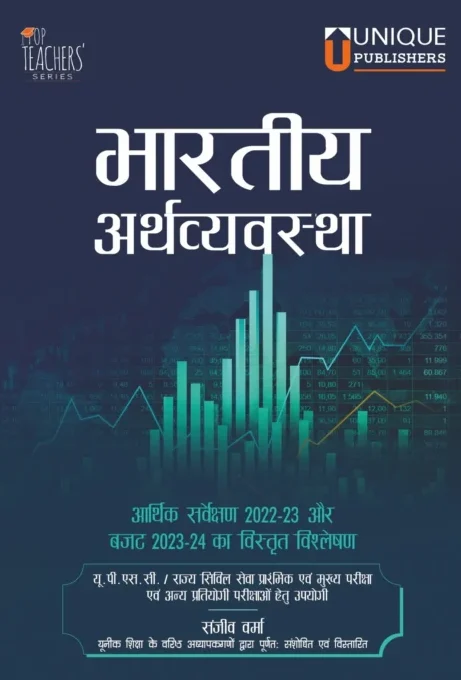
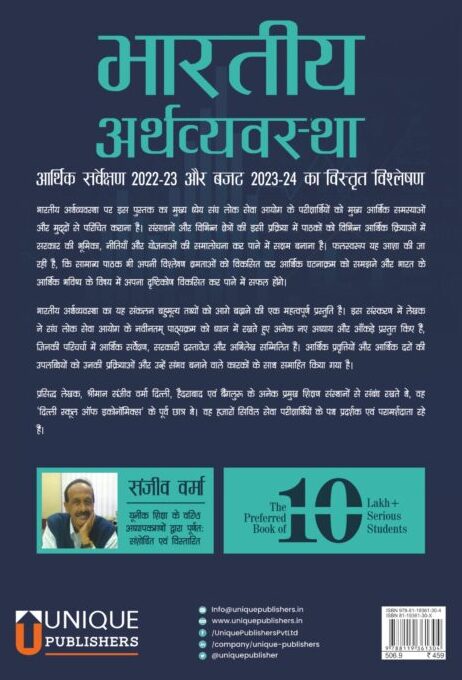
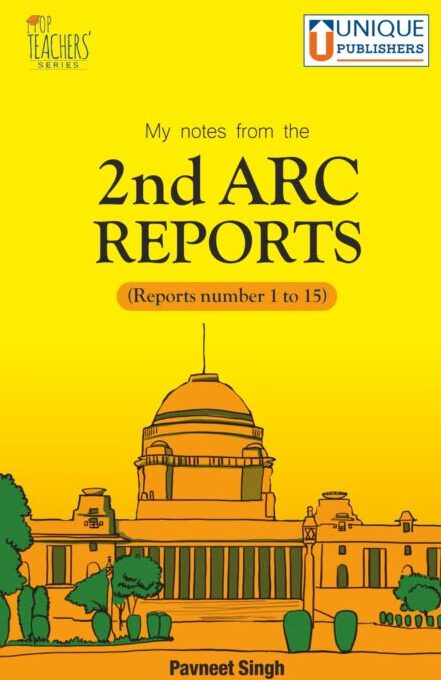

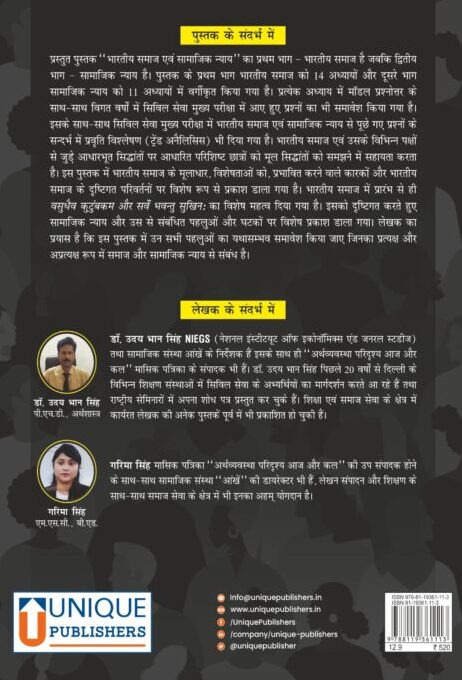

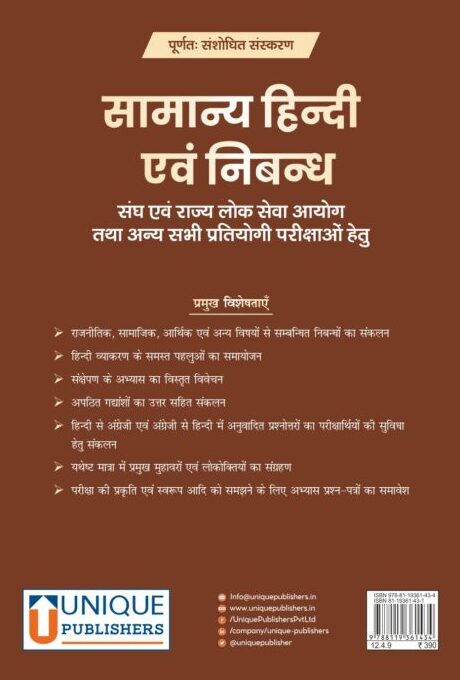
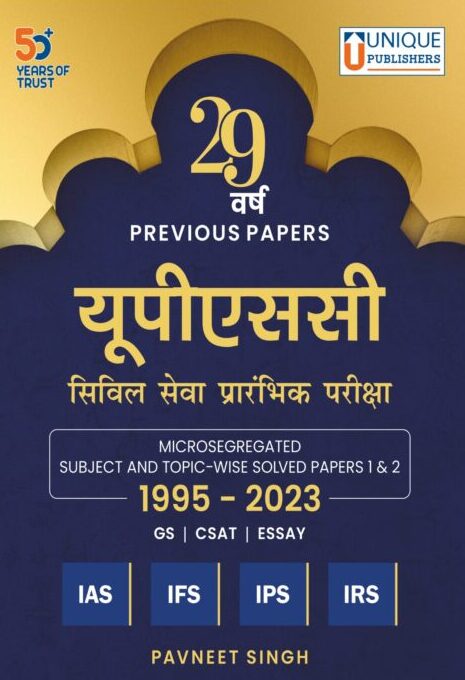


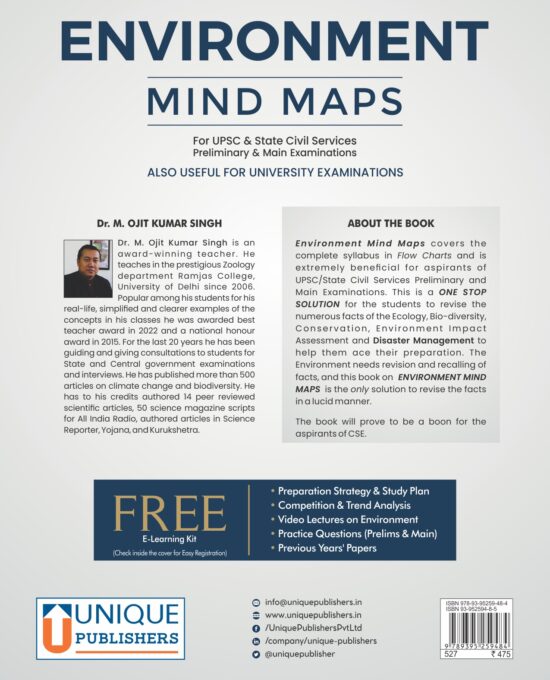
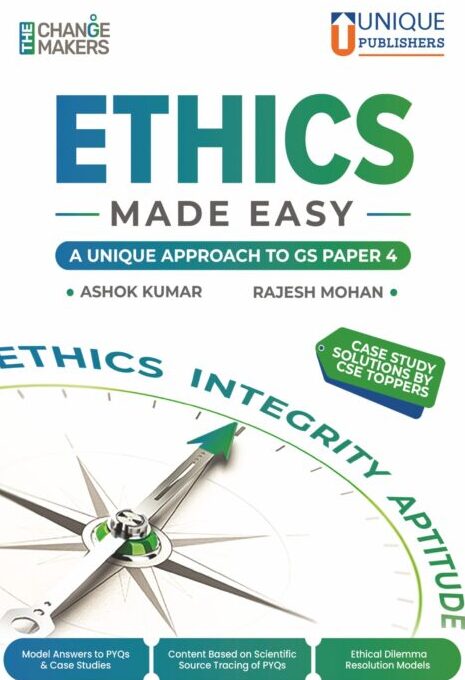
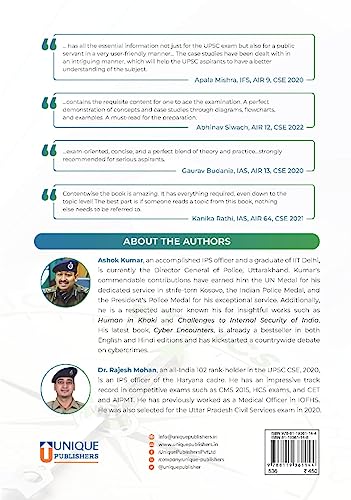

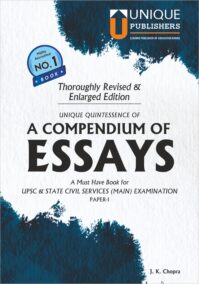
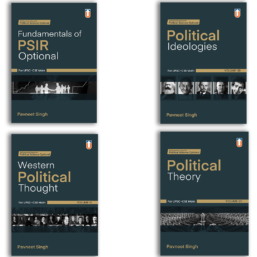
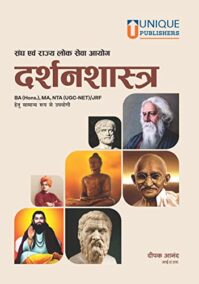
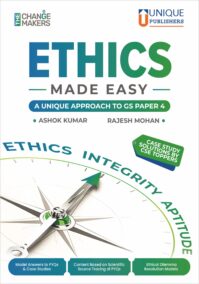
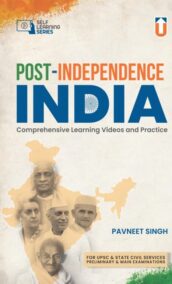
Reviews
There are no reviews yet.